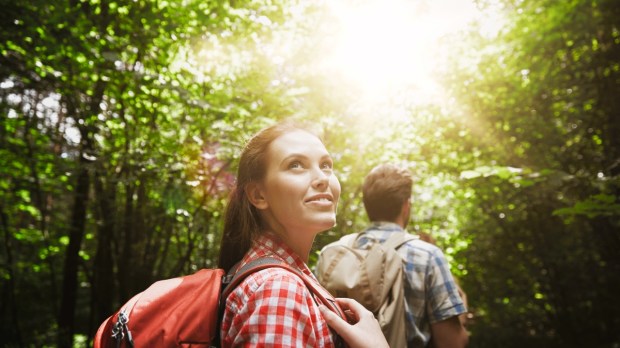Hiking together is a fun and healthy activity, as long as you go prepared with the proper gear and follow basic safety guidelines. Whether you are going on a pilgrimage or simply following a trail through the forest, one of the main benefits of hiking is that it brings you closer to nature and to our Creator.
Nothing beats standing on a mountaintop with your friends or looking out at a spectacular landscape with your family and recognizing something beautiful together. As far as we know, human beings are the only creatures on our planet who do this. We are made to recognize and give thanks for beauty.
In order to fully enjoy the experience of hiking, however, there is one practice that I have found to be particularly helpful – silence.
What is silence?
Perhaps asking what silence is seems like a silly question. But by silence, I don’t just mean the absence of talking or making noise (although that is a must!).
The kind of silence I’m talking about is something active. It’s an attitude or awareness that we can cultivate, in which we try to let go of all our thoughts and ideas and open ourselves to everything outside ourselves – to the presence of other people, the trail we are walking on, the beauty around us … but also to that mysterious but very real presence that gives all of these other things their existence and meaning.
Obviously, part of the fun of being with your family and friends is the chance to catch up with them and share your life. But I do think that a period of intentional silence – it can be as little as 15 minutes or last up to an hour – can actually help you feel closer and more connected to the people you are with. By trying to practice even a short moment of silence, we give ourselves the possibility have becoming more aware of the common need we all have for beauty and meaning.
And yes, I think a silent period of hiking is something that you can also propose to children. They may find it especially difficult to be quiet, and they may not be very successful at it, but even a few minutes of trying to be silent can be a positive thing. Just don’t get upset with your kids (or adult friends) if (or when) they fail at it. Silence is actually something you can get better at with practice. I know this from personal experience.
How I learned the value of silence
The first time some friends proposed that we walk in silence for an hour or so, I didn’t like it. The experience felt very artificial. Being a person who instinctively rebels against any kind of imposed rule, all I could think about for that hour was how I wanted to talk!
But when my friends made the same suggestion later for a different hike, I took their proposal a little more seriously. We were a fairly large group hiking up a mountain in New Hampshire. At one point, about halfway up the trail, the person in the lead stopped and asked our group of about 50 people to finish the rest of the ascent in silence.
Everyone followed the suggestion, and I still remember how gripped I was by the quiet that suddenly fell over our group. Up to that moment, I had not even been aware of how much noise we had been making. I was too busy talking and making jokes to notice.
A change in awareness
As I continued hiking with my friends, the landscape started to seem more intense. It wasn’t that the scenery had changed, of course, it was just that all the details and the rocks and sky and tree line below suddenly came to the forefront of my consciousness.
I suppose some folks would call this “communing with nature.” To me, the moment felt more sacred than that. Seeing all the beauty around me, I realized that even that wasn’t enough, I wanted more beauty, “Infinite Beauty,” as Pope Benedict XVI once said. I also sensed that many of the people I was hiking with felt the same thing. Thanks to that silence, the hike had become an act of prayer.
There was another effect, less spectacular, but equally important. While I had been walking and talking, I had been so engaged with the friends immediately around me that hadn’t really noticed any of the other people nearby. During that silent period, I became much more aware (as we all did) that some of the people on the hike were having a harder time than others.
We started offering helping hands to those who were having trouble climbing, offering water, and offering to help carry backpacks and small kids. Again, it wasn’t as if my friends and I had miraculously become better and more charitable people. We simply began to recognize the needs of the others around us. That too is one of the fruits of silence.
Reaching the summit
Arriving at the summit of the mountain that day was an act of joy. I have seen more spectacular views over the years, but that particular moment felt especially meaningful. We had lunch together and we sang (another ancient practice that I highly recommend).
Nobody proposed that we walk down the mountain in silence, but the descent was fairly quiet. We were all pretty tired by then.



